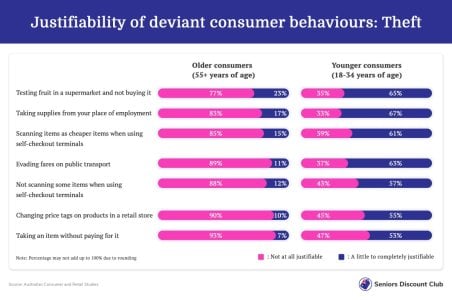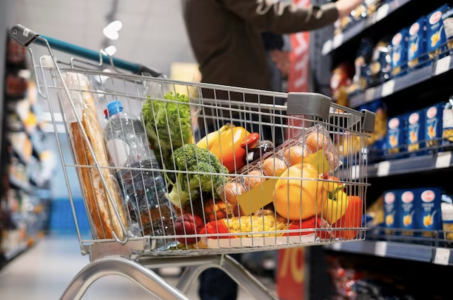Shoplifter reveals unique reason they steal only from big supermarkets
By
VanessaC
- Replies 25
As Australia grapples with a punishing cost-of-living crisis, an increasing number of households have been feeling the pinch.
Grocery prices have certainly skyrocketed, with the average family now paying a whopping $1,924 more at the checkout than a year ago.
Inflation is rampant across all areas of the economy, putting massive pressure on already stretched budgets.
As more and more people struggle to make ends meet, this reality has led to increased shoplifting cases across the country.
One anonymous Aussie has revealed that they regularly steal up to $300 worth of items from major retailers like Coles, Woolworths and Kmart.
Retail giants like Coles and Woolworths have introduced a raft of new security measures, including the use of artificial intelligence and high-tech cameras at self-serve checkouts, self-locking trolleys, and gates that don’t open if sensors deem an item has been stolen—much to the disappointment of many shoppers.
However, the effectiveness of these measures remains questionable.
'There’s cameras with footage directly of your face now, but it doesn’t deter me,' the anonymous shoplifter confessed.
They went on to explain their motivations, saying the struggle to find an affordable rental property and keeping their pet cat fed amidst rising costs were big factors.
'[Supermarkets] will still be swimming in profits whether I steal a can of $2 cat food or not,' the shopelifter said.
Coles reported a 20 per cent stock loss from shoplifting and food waste as they revealed a $1.1 billion profit in the latest financial year. On the other hand, Woolies estimated a quarter of stock loss due to theft when they revealed their $1.62 billion profit.
They also said that they would never target smaller businesses.
Even on the front lines dealing with shoplifters, retail workers have mixed feelings.
One Woolworths deli worker said they often turn a blind eye, assuming the person must be in dire straits.
The worker also shared that they would secretly mark down items for friends and customers after seeing large price jumps.
'If I have the power to do it, and it’s not that risky for me, then I'll happily do what I can to help out,' they confessed.
'It's not like I get paid extra if I stop shoplifting.'
But do all the pressures justify the act of stealing?
According to research by Monash Business School’s Australian Consumer and Retail Studies (ACRS) group, attitudes towards retail theft vary widely across generations. Those between 18 and 34 years of age are far more likely to justify shoplifting than those over 55.
Moreover, 28 per cent thought retail theft was either little, somewhat, very, or completely justifiable. Self-serve checkout theft skewed toward being more acceptable at 32 per cent.
See the results of the study below:

The Australian Retail Association claimed that shoplifting has seen a 'steady increase' and has cost the industry an average of $9 billion annually.
There has also been an increase in organised crimes targeting high-price items and reselling them as service to people struggling to buy the items in-store.

Members, what are your thoughts on this story? Share them with us in the comments below!
Grocery prices have certainly skyrocketed, with the average family now paying a whopping $1,924 more at the checkout than a year ago.
Inflation is rampant across all areas of the economy, putting massive pressure on already stretched budgets.
As more and more people struggle to make ends meet, this reality has led to increased shoplifting cases across the country.
One anonymous Aussie has revealed that they regularly steal up to $300 worth of items from major retailers like Coles, Woolworths and Kmart.
Retail giants like Coles and Woolworths have introduced a raft of new security measures, including the use of artificial intelligence and high-tech cameras at self-serve checkouts, self-locking trolleys, and gates that don’t open if sensors deem an item has been stolen—much to the disappointment of many shoppers.
However, the effectiveness of these measures remains questionable.
'There’s cameras with footage directly of your face now, but it doesn’t deter me,' the anonymous shoplifter confessed.
They went on to explain their motivations, saying the struggle to find an affordable rental property and keeping their pet cat fed amidst rising costs were big factors.
'[Supermarkets] will still be swimming in profits whether I steal a can of $2 cat food or not,' the shopelifter said.
Coles reported a 20 per cent stock loss from shoplifting and food waste as they revealed a $1.1 billion profit in the latest financial year. On the other hand, Woolies estimated a quarter of stock loss due to theft when they revealed their $1.62 billion profit.
They also said that they would never target smaller businesses.
Even on the front lines dealing with shoplifters, retail workers have mixed feelings.
One Woolworths deli worker said they often turn a blind eye, assuming the person must be in dire straits.
The worker also shared that they would secretly mark down items for friends and customers after seeing large price jumps.
'If I have the power to do it, and it’s not that risky for me, then I'll happily do what I can to help out,' they confessed.
'It's not like I get paid extra if I stop shoplifting.'
But do all the pressures justify the act of stealing?
According to research by Monash Business School’s Australian Consumer and Retail Studies (ACRS) group, attitudes towards retail theft vary widely across generations. Those between 18 and 34 years of age are far more likely to justify shoplifting than those over 55.
Moreover, 28 per cent thought retail theft was either little, somewhat, very, or completely justifiable. Self-serve checkout theft skewed toward being more acceptable at 32 per cent.
See the results of the study below:

The Australian Retail Association claimed that shoplifting has seen a 'steady increase' and has cost the industry an average of $9 billion annually.
There has also been an increase in organised crimes targeting high-price items and reselling them as service to people struggling to buy the items in-store.
Key Takeaways
- Extreme security measures from supermarket giants like Coles and Woolworths did not prevent one anonymous Aussie from shoplifting due to cost-of-living pressures.
- The confessed shoplifter has cited difficulty securing affordable rent and feeding her pet as motivations for her theft.
- A Woolworths deli worker has admitted to disregarding shoplifting and even secretly marking down items for friends and customers after seeing large price jumps.
- Research from Monash Business School’s Australian Consumer and Retail Studies group found that over a quarter of respondents thought retail theft was at least somewhat justifiable.
Last edited:








